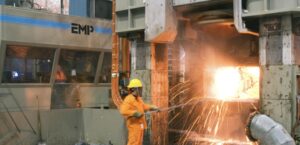What is ERP Security and How Can You Prevent Risks?

Digital data is one of the most valuable resources in the world. As technology grows, it becomes more valuable and needs protection. While most small and medium-sized businesses agree on digital data’s significance, most SMBs don’t have a well-defined digital strategy that includes data protection.
As SMBs become more reliant on technology, the risk of cybersecurity breaches increases. With more people working remotely, more information is transmitted across wireless networks and distributed beyond corporate firewalls. Businesses must not only protect more data but secure it in more places to give workers the access they need to do their jobs.
ERP solutions are one way to protect data. ERP data security means taking proactive measures against malicious intrusion inside your ERP system. Some aspects of ERP data security to consider are infrastructure, network, operating system, and database security. ERP solutions aren’t all the same but in general, ERP vendors should be responsible for data encryption, network, traffic protection, platform, application, operations system, firewall, and configuration. Cloud-based ERP solutions place most of the risk on the ERP provider releasing the organization from the heavy burden of multi-layer security.
Not all ERPs are the same. Some service providers own and operate the infrastructure on which the applications run, while others deploy their solutions on third-party cloud infrastructure, such as that provided by Amazon Web Services (AWS) and others. As a client, be prepared to be responsible for client-side encryption, data integrity and authentication, and site-to-site VPN. There are also other ways to keep ERP security risks low. Keep reading to learn more.
Two-factor authentication (2FA) should be used by every employee. This requires secure logins by preventing password sharing and can keep your company accountable for sensitive data and customer information. A maintained accreditation log with authorizations and checklists for new hires, promotions, and role changes will also help keep unauthorized access to a minimum.
Role-based data authorization is another way to keep information from being shared where it shouldn’t be. Giving team members read-only access to your organization’s most important information and updating the status of workers who become lost through promotions or department changes keeps information from being altered and reduces mistakes.
Having a fully trained staff is one of the best ways to combat duplicate and outdated records in your ERP system. Employees who are confident using the ERP software won’t be tempted to use unauthorized software as a workaround. Fully utilizing the capabilities of the ERP system prevents data from having more than one record in your system and making it susceptible to fraud. Ensure that all employees are trained and recertified regularly. Building and maintaining confidence with end-users keep them informed and actively putting company security first.
Finally, have a plan of action in place in case the unthinkable happens. A disaster recovery plan reduces downtime and loss of valuable time and money. A clear plan that outlines responsibilities provides the quickest path to recovery.
Interested in more information about how Decision Resources can help your business with ERP data security? Call us at 412-562-9660 or email info@decision.com.
Similar Blogs

Chips, drugs, and steel — how to prepare for Trump tariffs

How Steel Manufacturers Forge Ahead with Infor CloudSuite Industrial ERP





